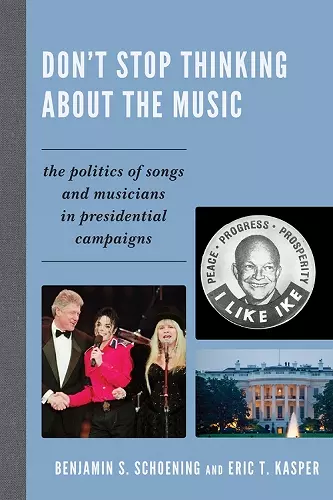Don't Stop Thinking About the Music
The Politics of Songs and Musicians in Presidential Campaigns
Eric T Kasper author Benjamin S Schoening author
Format:Hardback
Publisher:Lexington Books
Published:16th Dec '11
Currently unavailable, and unfortunately no date known when it will be back
This hardback is available in another edition too:
- Paperback£45.00(9780739165478)

In this insightful, erudite history of presidential campaign music, musicologist Benjamin Schoening and political scientist Eric Kasper explain how politicians use music in American presidential campaigns to convey a range of political messages. From “Follow Washington” to “I Like Ike” to “I Got a Crush on Obama,” they describe the ways that song use by and for presidential candidates has evolved, including the addition of lyrics to familiar songs, the current trend of using existing popular music to connect with voters, and the rapid change of music’s relationship to presidential campaigns due to Internet sites like YouTube, JibJab, and Facebook. Readers are ultimately treated to an entertaining account of American political development through popular music and the complex, two-way relationship between music and presidential campaigns.
In exploring the history of presidential campaign songs, Schoening and Kasper (both, Univ. of Wisconsin, Barron County) researched a wide range of primary and secondary sources. Following the brief introduction are eight chapters divided into three parts dealing with the "traditional era," the "mass media era," and the "popular music era." The authors begin with the earliest campaigns (1789), in which music was sparse. The 1840 campaign was the first to feature music, and campaign songs proliferated through the latter half of the 19th century and into the 20th. Campaigns increasingly used commercially produced pop songs after midcentury. In discussing all this, the authors provide information on the candidates, details on changes in technology (from songbooks to the Internet), and the words to many of the songs. Though third-party presidential efforts, such as the Henry Wallace Progressive Party campaign (1948), are unfortunately overlooked, there is an interesting discussion of the role of the Internet in the 21st century. There is a very helpful, although selective, bibliography, which includes such important sources as Songs America Voted By, comp. and ed. by Irwin Silber (1971). Summing Up: Recommended. Lower-division undergraduates through faculty; general readers. * CHOICE *
In this book, Benjamin Schoening and Eric Kasper capture the power of music in politics in ways that are informative, engaging, illuminating, and (in some cases) inspiring. Combining their interests and expertise, the authors explore identity forming national anthems from around the world, as well as the politics of censorship and dissent. The result is nothing less than a delightful success. Schoening and Kasper have produced a book that will be enjoyed by scholars, students, and anyone interested in the soundtrack of our political world. -- Joseph J. Foy, University of Wisconsin Colleges
Benjamin Schoening and Eric Kasper have written an important book on the use of music in American presidential politics. Covering a lot of history and a lot of music, the book is must reading for those interested in the rapidly expanding field of political musicology, especially relating to elections and voting. -- Courtney Brown, author of Politics in Music: Music and Political Transformation from Beethoven to Hip-Hop
Because music can have a large impact on emotion, and emotion has a significant influence on political decisions, this book is a necessary read for anyone who wants to more fully understand political messaging and campaign politics. -- Timothy M. Dale
Schoening and Kasper offer an intriguing and thought provoking expose on the use (and misuse) of music to further political ends. -- Craig W. Hurst, University of Michigan, University of Wisconsin Waukesha
Schoening and Kasper recount a fascinating history of presidential songs, from their tentative origins in the campaigns of John Adams and Thomas Jefferson, through the major breakthrough in campaign marketing achieved by William Henry Harrison in 1840, to the rancorous campaigns of the late 19th century and the exuberant songsmithing of the vaudeville era. * Pasatiempo *
- Winner of UW Colleges 2012-13 Barrington-Musolf Faculty Research Award 2013
ISBN: 9780739165461
Dimensions: 240mm x 162mm x 28mm
Weight: 626g
312 pages